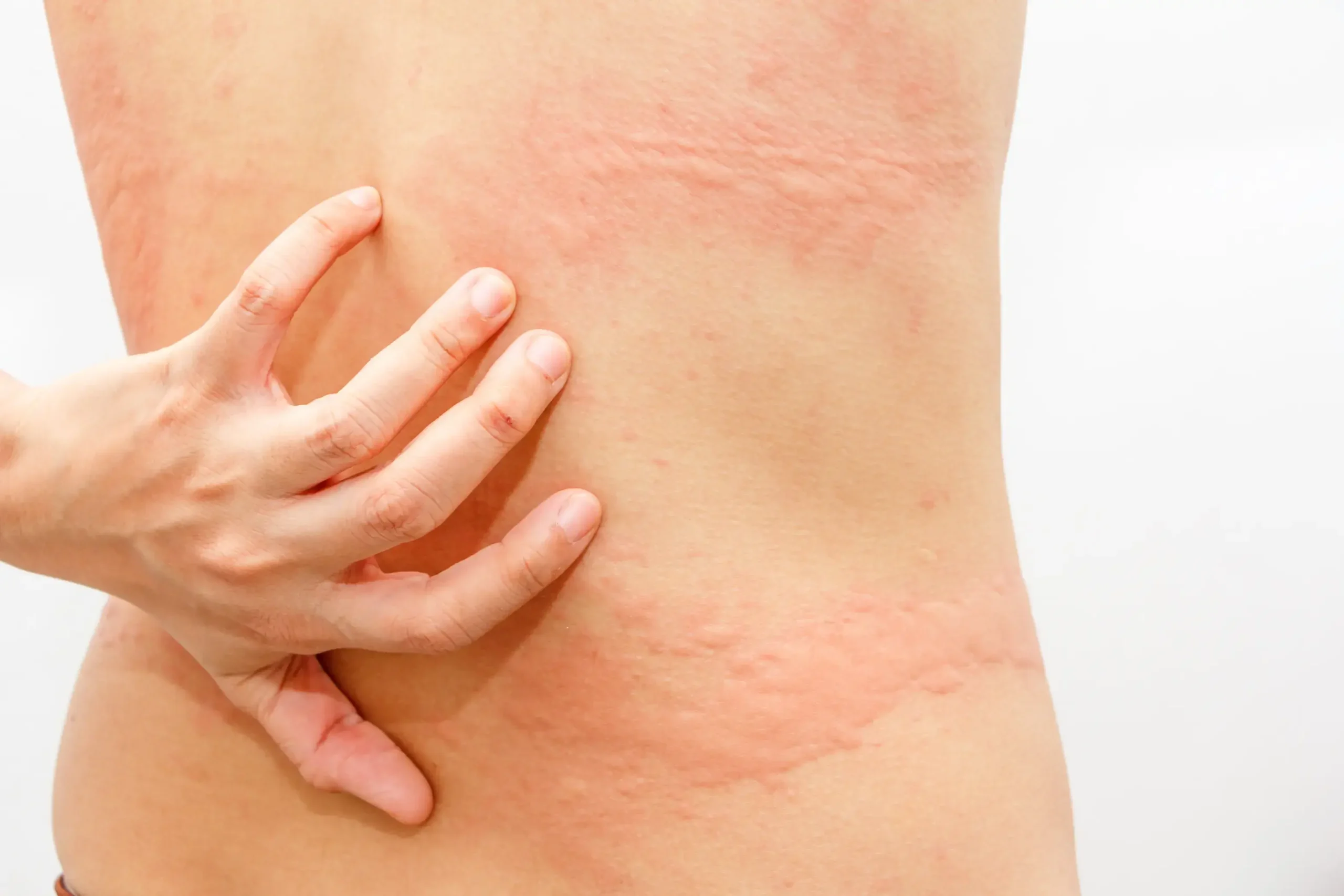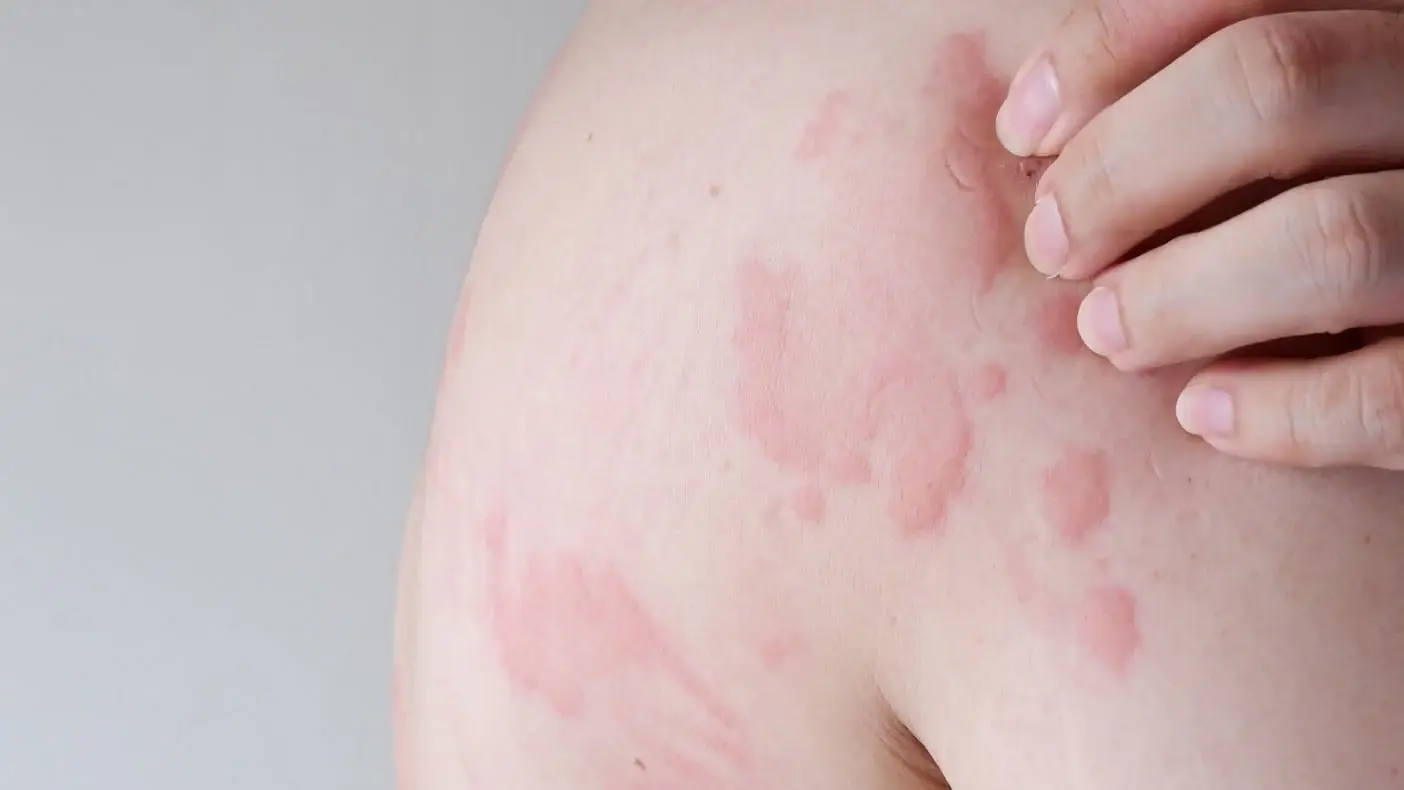Urticaria

Urticaria Treatment in New Delhi – Dr. Mahajan’s Skin to Bone Clinic
Effective Management of Urticaria by Dermatologist Dr. Shruti Patil
Urticaria, commonly known as hives, is a skin condition characterized by itchy, raised welts that appear suddenly and can cause discomfort. At Dr. Mahajan’s Skin to Bone Clinic in New Delhi, our expert Dermatologist Dr. Shruti Patil specializes in the diagnosis, treatment, and management of urticaria, offering patients long-lasting relief from this distressing condition.
With personalized care and advanced treatment options, Dr. Patil ensures effective management tailored to each patient’s needs, helping them achieve clear and healthy skin.
Urticaria, commonly known as hives, is a skin condition characterized by itchy, raised welts that appear suddenly and can cause discomfort. At Dr. Mahajan’s Skin to Bone Clinic in New Delhi, our expert Dermatologist Dr. Shruti Patil specializes in the diagnosis, treatment, and management of urticaria, offering patients long-lasting relief from this distressing condition.
With personalized care and advanced treatment options, Dr. Patil ensures effective management tailored to each patient’s needs, helping them achieve clear and healthy skin.
What is Urticaria?
Urticaria is a skin reaction that causes red or skin-colored welts (hives) to appear, often accompanied by itching, burning, or stinging. These welts can vary in size and shape and may fade within hours or persist for days.
Types of Urticaria:
- Acute Urticaria: Symptoms last less than six weeks and are often triggered by allergies, infections, or environmental factors.
- Chronic Urticaria: Symptoms persist for more than six weeks, and the cause is often idiopathic or related to autoimmune issues.
- Physical Urticaria: Triggered by physical stimuli like cold, heat, sunlight, pressure, or exercise.
Common Causes of Urticaria
Allergies (food, medications, insect bites).
Viral or bacterial infections.
Stress or emotional factors.
Exposure to cold, heat, or sunlight.
Autoimmune conditions.
Certain underlying health conditions.
Symptoms of Urticaria
Raised, red or skin-colored welts that may merge into larger patches.
Itching or burning sensation.
Swelling in the affected areas (angioedema).
Symptoms that worsen with specific triggers like stress or physical activity.d a dull, lifeless appearance. Tan and dull skin not only affect your confidence but may also signify underlying skin damage that needs attention.
Urticaria Treatment at Dr. Mahajan’s Skin to Bone Clinic
Dr. Shruti Patil offers a holistic approach to urticaria management, focusing on identifying triggers and alleviating symptoms:
1. Antihistamines
First-line treatment to block histamine, the chemical responsible for hives.
Provides quick relief from itching and redness.
2. Advanced Medications
Leukotriene Receptor Antagonists: Used in combination with antihistamines for severe cases.
Immunosuppressants: For chronic or autoimmune-related urticaria.
Biologics (Omalizumab): A cutting-edge therapy for chronic idiopathic urticaria, offering targeted relief.
3. Allergy Testing and Trigger Management
Comprehensive allergy testing to identify specific triggers.
Customized advice on lifestyle modifications to avoid flare-ups.
4. Lifestyle & Dietary Guidance
Guidance on reducing stress, avoiding allergens, and maintaining a healthy lifestyle to minimize symptoms.
5. Specialized Skin Care Regimens
Topical treatments to soothe inflamed skin and reduce discomfort.
Why Choose Dr. Mahajan’s Skin to Bone Clinic for Urticaria Treatment ?
Expert Dermatologist: Dr. Shruti Patil has extensive experience in diagnosing and managing various forms of urticaria.
Comprehensive Care: From acute to chronic urticaria, we provide tailored solutions for effective and lasting relief.
Cutting-Edge Therapies: Advanced treatments, including biologics and immunotherapy, for difficult-to-treat cases.
Patient-Centric Approach: Individualized care plans to address the unique needs of every patient.
Prime Location: Conveniently located in the heart of New Delhi.
Preventive Tips for Urticaria
Identify and avoid known triggers, such as allergens or irritants.
Wear loose, comfortable clothing to prevent skin irritation.
Use gentle, hypoallergenic skin care products.
Maintain hydration and a balanced diet.
Manage stress through relaxation techniques or therapy.
Frequently Asked Questions
1. Is urticaria contagious?
No, urticaria is not contagious. It is an immune response or reaction to specific triggers.
2. Can urticaria be cured completely?
Acute urticaria can often be resolved with proper treatment and trigger avoidance. Chronic urticaria may require ongoing management but can significantly improve with advanced therapies.
3. How soon can I see results from treatment?
Many patients experience relief from itching and redness within days of starting treatment, though chronic cases may take longer.
4. What should I do during a severe urticaria flare-up?
Seek immediate medical attention if symptoms worsen or if you experience swelling in the throat, difficulty breathing, or severe discomfort.
1. Antihistamines
First-line treatment to block histamine, the chemical responsible for hives.
Provides quick relief from itching and redness.
2. Advanced Medications
Leukotriene Receptor Antagonists: Used in combination with antihistamines for severe cases.
Immunosuppressants: For chronic or autoimmune-related urticaria.
Biologics (Omalizumab): A cutting-edge therapy for chronic idiopathic urticaria, offering targeted relief.
3. Allergy Testing and Trigger Management
Comprehensive allergy testing to identify specific triggers.
Customized advice on lifestyle modifications to avoid flare-ups.
4. Lifestyle & Dietary Guidance
Guidance on reducing stress, avoiding allergens, and maintaining a healthy lifestyle to minimize symptoms.
5. Specialized Skin Care Regimens
Topical treatments to soothe inflamed skin and reduce discomfort.
Why Choose Dr. Mahajan’s Skin to Bone Clinic for Urticaria Treatment ?
Expert Dermatologist: Dr. Shruti Patil has extensive experience in diagnosing and managing various forms of urticaria.
Comprehensive Care: From acute to chronic urticaria, we provide tailored solutions for effective and lasting relief.
Cutting-Edge Therapies: Advanced treatments, including biologics and immunotherapy, for difficult-to-treat cases.
Patient-Centric Approach: Individualized care plans to address the unique needs of every patient.
Prime Location: Conveniently located in the heart of New Delhi.
Preventive Tips for Urticaria
Identify and avoid known triggers, such as allergens or irritants.
Wear loose, comfortable clothing to prevent skin irritation.
Use gentle, hypoallergenic skin care products.
Maintain hydration and a balanced diet.
Manage stress through relaxation techniques or therapy.
Frequently Asked Questions
1. Is urticaria contagious?
No, urticaria is not contagious. It is an immune response or reaction to specific triggers.
2. Can urticaria be cured completely?
Acute urticaria can often be resolved with proper treatment and trigger avoidance. Chronic urticaria may require ongoing management but can significantly improve with advanced therapies.
3. How soon can I see results from treatment?
Many patients experience relief from itching and redness within days of starting treatment, though chronic cases may take longer.
4. What should I do during a severe urticaria flare-up?
Seek immediate medical attention if symptoms worsen or if you experience swelling in the throat, difficulty breathing, or severe discomfort.

